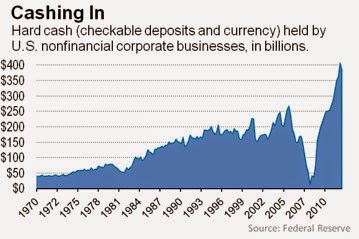Week links (6)

Another edition of some of the finest texts in the blogosphere for the past week or so: 1. "Australian PM makes pitch for budget cuts" , Wall Street Journal . Finally a Prime Minister with some sense: “This will not be a budget for the rich or the poor ... This will be a nation-building budget, even though it cuts spending, because you can’t build a nation spending money you don’t have and that’s more than you need to borrow.” And this all despite the fact that Australia's budget deficit is far lower than that of the US and most European countries (down at 1.9% of GDP), plus their debt is among the lowest in the developed nations. 2. "Recovery has created far more low-wage jobs than better paid ones" , NY Times , according to the new report from NELP . Source: NYT Could insourcing partially explain a part of this trend? Or is the problem much deeper ? 3. Bryan Caplan: "Cowen and Crisis Reconsidered" , EconLog - Caplan reevaluates



